DST-SERB international research fellowship for Dr Raviteja
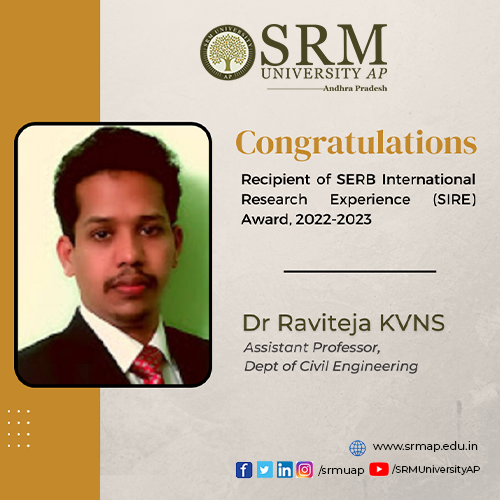
SERB International Research Experience (SIRE) is a coveted opportunity for passionate researchers to collaborate with leading institutions across the globe for high-end research training in frontier areas of Science and Technology. Dr Raviteja from the Department of Civil Engineering has earned this opportunity through his resourceful project titled “Sustainable Ash based Geosynthetic Clay Liners for MSW Landfills”. The work proposes a sustainable design of solid waste landfill liners using industrial by-products like fly ash.
Municipal solid waste (MSW) landfills need to be lined at the bottom to avoid contaminant transport. The conveyance of noxious pollutants from the landfill to the natural ground can be restricted using natural or synthetic barriers. In general, natural materials like clays/bentonites in combination with geomembranes (GMB) are used in liners. However, to increase the strength properties and reduce the compressibility characteristics, bentonites are often mixed with sand. With the increased cost and scarcity of sand, there is a renewed interest among the researchers to identify an alternative material to replace sand proportion in compacted GCLs in MSW landfills. Among several materials, fly ash is proved to be a potential substitute for sand in landfill liners.
This experience will serve as an excellent opportunity to work at one of the world-renowned, state-of-the-art geoenvironmental laboratories at the University of Illinois Chicago. “I feel fortunate to collaborate with Prof. Krishna Reddy, one of the eminent researchers in the geoenvironmental research fraternity. My research at UIC would be on developing sustainable ash-based geosynthetic clay liners for MSW landfills. I also wish to pursue recent advances in this area and identify a framework for my future research”, said Dr Raviteja. The project will help him establish strong research collaborations with experts in the geotechnical labs at other US universities. He can also make field visits to identify the practical problems and direct his research toward the real-field applicability.
With an enriching research exposure at UIC, he will be able to formulate innovative and advanced research problems to enhance the visibility and applicability of his project. Presenting this work at various conferences and seminars will also attract various potential collaborations and MoU with other universities abroad. According to him, “this is a less explored domain that will immensely benefit research scholars and undergraduate students to invent new possibilities and scopes in the future”.
- Published in CIVIL NEWS, Departmental News, Faculty Achievements, News, Research News
Dr Anu Kuriakose bestowed with CM’s Nava Kerala Research Fellowship
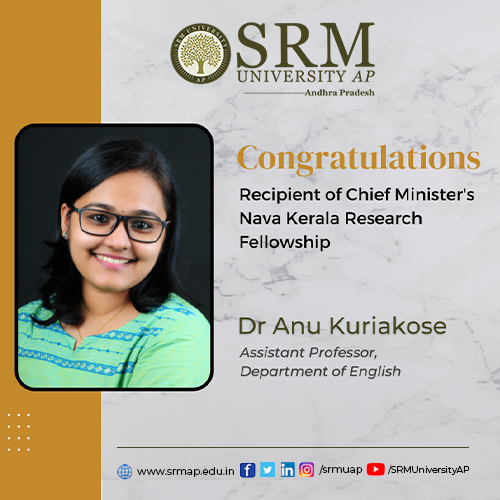
The Government of Kerala has chosen Dr Anu Kuriakose from the Department of English for the prestigious Chief Minister’s Nava Kerala Research Fellowship in the stream of Political Science, Historical Studies, Humanities & Liberal Arts. The award has been designed by Kerala Government to further the state’s development plans by promoting research across various disciplines. Dr Anu obtained the grant for her intriguing study in the domain of gender studies. She intends to look at the digital turn in the genderqueer movements in Kerala with a cross-cultural perspective from any specific locale in Europe.
There have been many research studies involving the examination of queer and trans representation in media. With the turn of the century, we witnessed a remarkable shift in the digital representation of the queer community.
Through her research “Dissenting Heteronormativity and Mainstreaming Identity: A Critical Assessment of the Digital Turn in GenderQueer Movements in Kerala”, Dr Anu is fixated on uncovering the digital collectives in which Malayali genderqueer people are also a part of and the digital turn in the genderqueer movement in Kerala, of late.
She expressed her delight over receiving this opportunity that could help her make substantial contributions to the state’s progress. “I feel proud and humbled for getting this title; my project aims to map the genderqueer movements, the digitally networked associations of which Malayali gender non-conforming people are part, and the nuances of their digital turn at present”, she said.
The Department of English, University of Calicut, has agreed to be a hosting centre for the research project. The GEXcel International Collegium for Advanced Transdisciplinary Gender Studies, Karlstad University Sweden, has also agreed to collaborate. She also wishes to make SRM University-AP a stakeholder in the same.
“I am hugely motivated by the weight SRM University-AP gives to research. From making collaborations to publishing papers in reputed journals and receiving grants from external bodies, the university has anchored as an encouraging platform to stimulate the research pursuits of its faculty and students”, she maintained. “I am truly indebted to my peers and everyone here for providing a conducive environment to fructify my research interests”, remarked Dr Anu.
- Published in Departmental News, English Current Happenings, English news, Faculty Achievements, News, Research News
Dr Divya Chaturvedi steps up her research with SERB-POWER grant
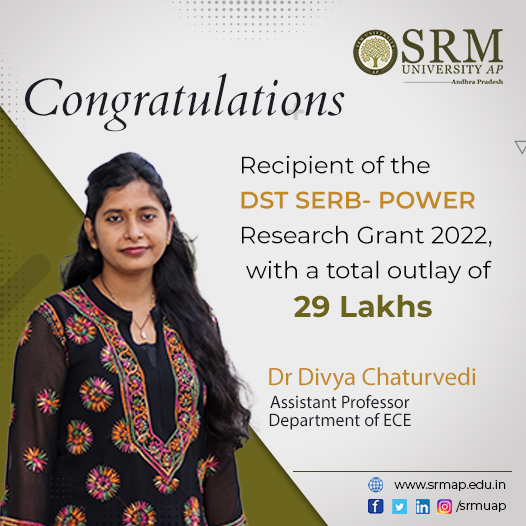
Dr Divya Chaturvedi from the Department of Electronics and Communication Engineering has been awarded the SERB-POWER research grant that amounts to a total of 29 lakhs for a period of three years. The grant was sanctioned for her research titled “Development of Breast Cancer Detecting System Based on Microwave Antenna-Array-Sensors and its Implementation to Internet of Medical Things (IoMT)”.
SERB- POWER (Promoting Opportunities for Women in Exploratory Research) research grants is a scheme initiated by the Government of India with an aim to encourage emerging and eminent women researchers for individual-centric and competitive mode of research funding to undertake R&D activities in frontier areas of science and engineering.
Her study on developing a breast cancer detection system has gained immense attention due to the global increase of the malady in recent decades. It has become the most common cancer diagnosed in women across all age groups. Despite the different tests such as Mammograms, ultrasound, and MRI available to diagnose the disease, there has been little considerable improvement in bringing down the caseload.
Dr Divya’s research intends to develop an advanced detection technique based on Antenna-Array-Sensors and she is attempting to put it into implementation through the Internet of Medical Things (IoMT). Connecting the medical devices to healthcare IT systems through online computer networks will allow the easier and quicker detection of the defect. This may go down as a milestone achievement in the medical domain.
The research grant will help in building better- equipped research lab with the most modern amenities and hiring more manpower to fulfil the project objectives. In the words of Dr Divya, “Better research facilities will aid the faculty in performing various experiments. They will save their travelling time to other universities for accessing research infrastructure. The students can also avail the advantage to intensify their research initiatives”. Through the project she envisions to establish a collaborative dedicated research group that will help in fulfilling the various objectives of the project.
- Published in Departmental News, ECE NEWS, Faculty Achievements, News, Research News
Dr Sujith Kalluri elected as the Honorary Secretary of IETE, Vijayawada Chapter
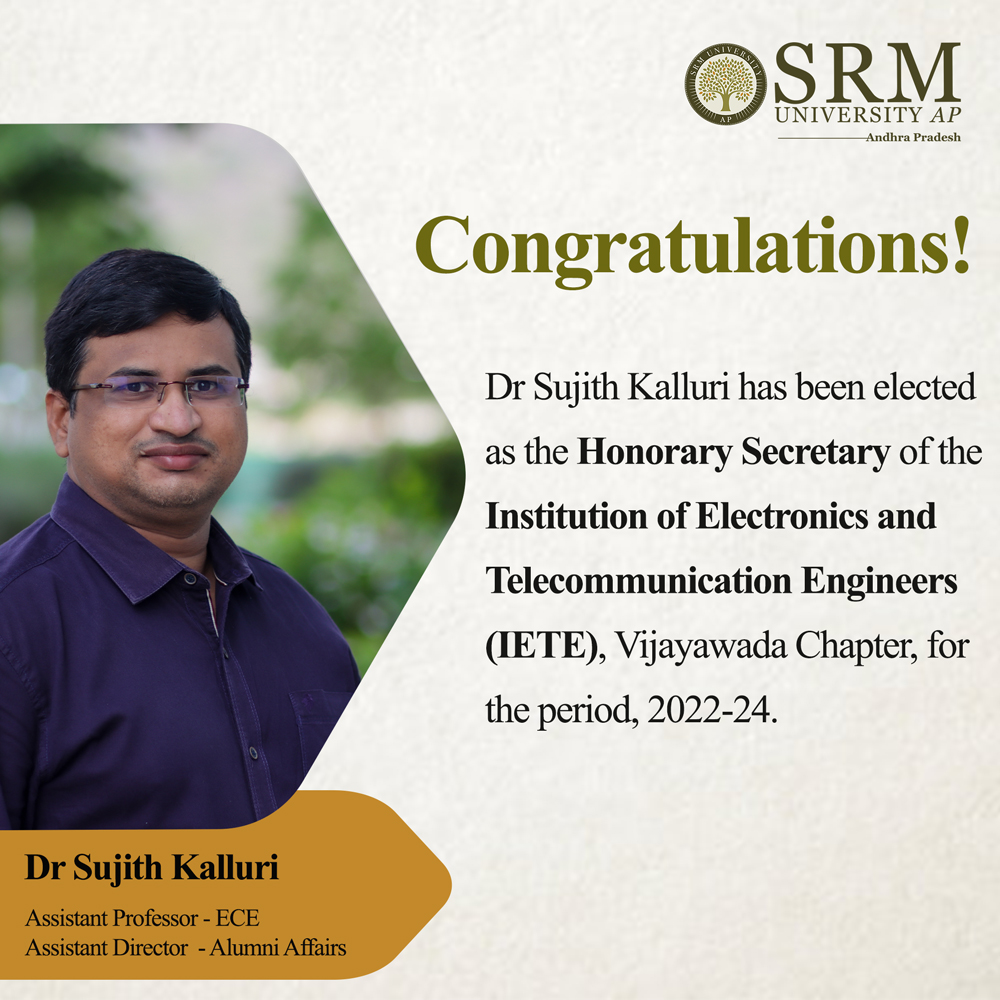
Dr Sujith Kalluri, Assistant Professor of the Department of Electronics and Communication Engineering, has been elected as the Honorary Secretary of the Institution of Electronics and Telecommunication Engineers (IETE), Vijayawada Chapter for the period, 2022-24. Dr Kalluri is one of the young and spirited faces of SRM University-AP who has already borne out his charisma and capacity as an influential teacher and passionate researcher. He is also the Assistant Director of Alumni Affairs, a forum that oversees and follows up on the activities of students graduating from the University.
SRM University-AP is proud and privileged to celebrate this achievement as Dr Kalluri is on a roll to make greater strides in his professional career. Being the youngest officer to assume the role of secretary at the office of IETE Vijayawada makes this even more special an accomplishment. “I am indeed privileged to assume the role of Honorary Secretary of the Institution of Electronics and Telecommunication Engineers (IETE) Vijayawada Chapter. This is an incredible opportunity to collaborate with various academic and industrial experts in relevant domains” he exclaimed.
IETE is India’s leading recognised professional society devoted to the advancement of Science and Technology in electronics, telecommunications and IT. The institution provides leadership in scientific and technical areas of direct importance to the national development and economy. The government of India has recognised IETE as a Scientific and Industrial Research Organisation (SIRO). Dr Kalluri intends to utilise this opportunity to conduct technical events, such as conferences, symposia, and exhibitions, that would benefit the student community to be industry ready and acquaint with different professional networking circles.
Dr Kalluri is an active member of the World Academic-Industry Research Collaboration Organization (WAIRCO), the Institute of Electrical and Electronics Engineers (IEEE), and the Australian Nanotechnology Network (ANN) among many others. “It is my passion to be associated with professional bodies. I take this as an exciting opportunity to build my leadership and organising skills that could facilitate my professional growth” remarked Dr Kalluri. “I would also like to convey my gratitude to the management and leadership teams at SRM University-AP who have always supported me in terms of availing such opportunities” he maintained.
- Published in Alumni Relations News, Departmental News, ECE NEWS, Faculty Achievements, News
Project Sanctioned by Indian National Science Academy
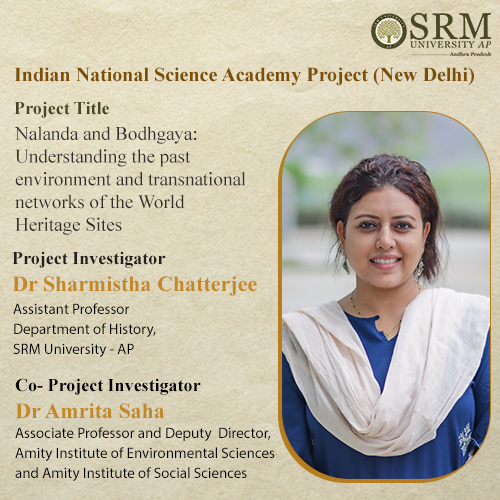
Yet another moment of pride and honour for SRM University-AP as the Indian National Science Academy (INSA, New Delhi) has sanctioned the Project “Nalanda and Bodhgaya: Understanding the past environment and transnational networks of the World Heritage Sites” to Dr Sharmishtha Chatterjee, Assistant Professor, Department of History with a total outlay of Rs 5 lakhs. The co-investigator of the project is Dr Amrita Saha, Associate Professor and Deputy Director, Amity Institute of Environmental Sciences and Amity Institute of Social Sciences, Amity University, Kolkata. The project is a pioneering initiative to make a comprehensive study of the landscape and environmental factors (physical and cultural) governing the Buddhist World Heritage Sites of Nalanda and Bodhgaya (Bihar, India).
One of the first attempts in South Asia to understand monasteries and monastic complexes in relation to the landscape parameters, the work is distinctive in its scope and methodology because of its multidisciplinary approach involving archaeology, history, and environmental science. It aims for a holistic understanding of the sites and the region. Bodhgaya and Nalanda are two major Buddhist sites of India, the first marking the site of enlightenment of Gautama Buddha and the other being one of the oldest educational institutes of ancient times. Both the sites have been witnessing travellers, pilgrims, students, and religious preachers from the farthest corners of the world.
The foremost objective is to investigate the environmental settings (location, settlement geography, palaeolandscape features, layout of the monastic complexes, dietary patterns) of the monastic sites. This will be executed through the generation of a series of maps by superimposing colonial site plans, old maps, satellite imageries and corroboration of the same with extensive field surveys. The scientific study of the topographic delineations, soil samples, and artefactual evidences would be undertaken in the course of the study.
These attempts would generate a detailed study of the regular lives in the two monastic complexes along with the social and cultural ties established with the lesser-known monasteries and villages of the hinterland area. The project also seeks to explore the local, national, and transnational networks emanating from the sites, thus contributing to a global networking. The project is expected to create frameworks for extending the study to the other monastic complexes across South and Southeast Asia. In the long run the work will be published in the form of an annotated atlas featuring the monastic complexes, the wider geographical hinterland, and the transnational networks between India and Southeast Asia. This would serve as one of the noteworthy contributions that puts forth a holistic study of the cultural landscapes of the World Heritage Sites.
- Published in Departmental News, Faculty Achievements, History Current Happenings, History News, News, Research News
Dr Ghanshyam Kumar Pandey to join the Editorial Board of SN Business and Economics
SN Business and Economics is a multidisciplinary journal that covers the areas of Economics, Finance, Business, and Management. Springer publishes the journal. It is supported by a team of experienced in-house editors and an international Editorial board. Recently, Assistant Professor Dr Ghanshyam Kumar Pandey from the Department of Economics was appointed as a member of the editorial board of SN Business and Economics.
He is responsible for providing feedback on an ad hoc basis to the in-house editors. He is in charge of verifying submitted papers’ suitability for external review. All SN Business and Economics editors work together to ensure that the submitted research is expertly handled. The team assesses and confirms the paper to be technically sound, academically valid, and ultimately suitable for publication.
Dr Ghanshyam Kumar Pandey will be the handling Editor for up to 3 papers per quarter. This involves nominating academic referees and making an editorial recommendation following peer review. When requested, he shall give the editorial policy or strategy feedback to the Editorial team. Initially, his tenure will last for one year.
- Published in Departmental News, Economics Current Happenings, Economics News, Faculty Achievements, News
Dr Divya Chaturvedi to join as a special issue guest editor at Hindawi
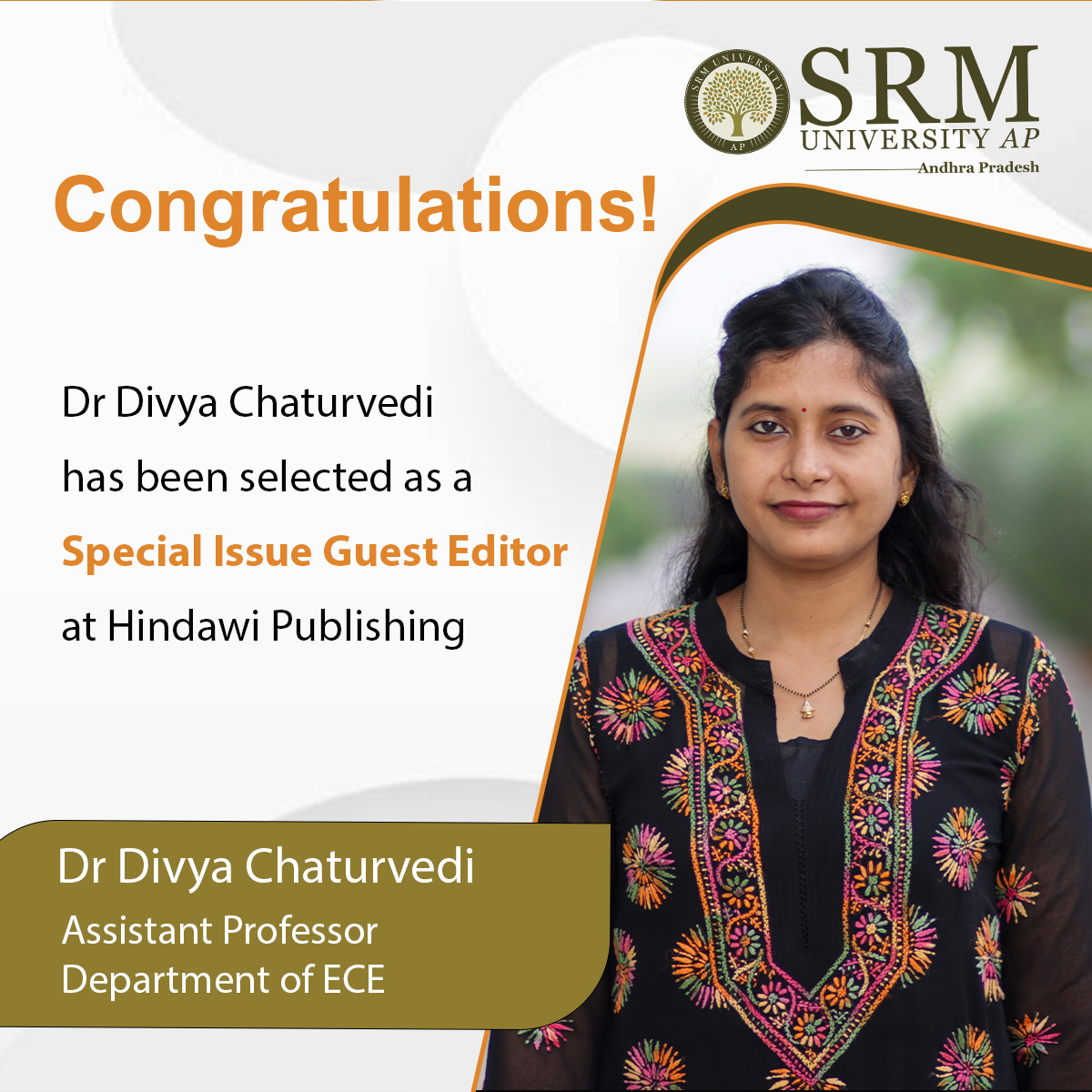
It is a matter of incredible honour to SRM University-AP, for Dr Divya Chaturvedi, Assistant Professor, Department of Electronics and Communication Engineering has been chosen as a special issue guest editor at Hindawi, one of the world’s largest publishers of peer-reviewed, fully open access journals of scientific, technical, and medical literature. Dr Divya has been keenly pursuing the umpteen possibilities of substrate integrated waveguide based cavity backed antennas, leaky wave antennas, wearable antennas for medical applications, and Multi-Input Multi-Output (MIMO) for 5G communication since the beginning of her career. And her research genius has bestowed her with numerous awards and recognitions over these years.
As a guest editor for Hindawi, Dr Divya would be responsible for the special issues “Substrate Integrated Waveguide (SIW) Based Circuits and Systems” and “The Future of Wireless Communications Systems: 5G and beyond” from the journals: International Journal of Antennas and Propagation and Journal of Computer Networks and Communications respectively. While the former aims to publish outstanding papers presenting cutting-edge advances in the field of microwave and millimetre-wave circuits and systems, the recent technological advancements in wireless communication systems will be focused in the latter.
Having served as the reviewer and member of various editorial boards and conferences, Dr Divya comes with a wealth of experience to put her expertise for the advancement of the publication. At Hindawi, she gets to work with a strong team of editors and network with like-minded colleagues around the world. ”It is truly fascinating to be a part of the Hindawi editorial board. The influential network that we build here could provide leads on professional opportunities or introduce us to new contacts in our discipline”, she remarked. This would also give her the liberty to handle manuscripts close to her professional interests and exert her creativity in the inception and development of a topic. The tenure of her role as an editor is expected to last for twelve months.
- Published in Departmental News, ECE NEWS, Faculty Achievements, News
Prof G S Vinod Kumar to be the Chief Faculty Mentor of Patent Maker
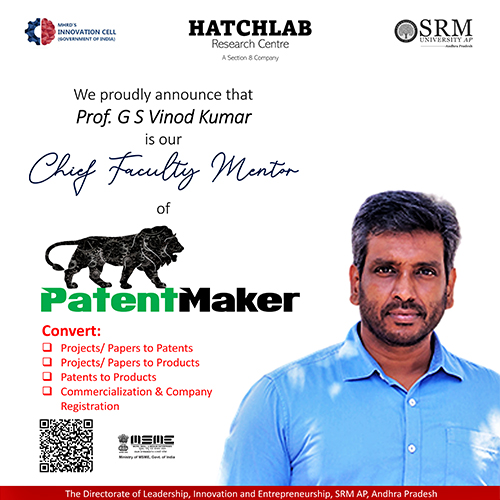 The Hatchlab Research Centre has been nurturing innovative ideas and inspirational ambitions for paving the way to an extraordinary tomorrow. Patent Maker was the beginning of a new chapter in these explorations, armed with the potential to work out the unworkable. The Directorate of Entrepreneurship and Innovations and is glad to announce that Prof G S Vinod Kumar, Department of Mechanical Engineering, has been appointed as the Chief Faculty Mentor of Patent Maker.
The Hatchlab Research Centre has been nurturing innovative ideas and inspirational ambitions for paving the way to an extraordinary tomorrow. Patent Maker was the beginning of a new chapter in these explorations, armed with the potential to work out the unworkable. The Directorate of Entrepreneurship and Innovations and is glad to announce that Prof G S Vinod Kumar, Department of Mechanical Engineering, has been appointed as the Chief Faculty Mentor of Patent Maker.
Prof G S Vinod Kumar, an expert, mentor, and multidimensional professional, has been there from the very inception of this initiative. Patent Maker is a common platform which will not only facilitate the conversion of ideas, products, concepts, and research papers to patents but will also help them commercialise with the help and support of the industry. It encourages every aspirant who wants to contribute to the nation and bridges the gap between industry and academia.
Hatchlab Research Centre believes in the power of connection and creates opportunities for students to converse their field of interest with experts around the map. The team actively engages in the university’s innovation, research, and entrepreneurship activities. The focus also relies on concreting a start-up ecosystem with the help of corporates, enablers, world-class mentors, top-class institutions, foundations, incubators, and the government. Patent Maker is one of the biggest initiatives of the Hatchlab Research Centre. It aspires to be a support system for projects and patents that deserve a high commercial application.
- Published in Faculty Achievements, IDEA NEWS, News
Presented paper at the East Asian Economic Association Convention
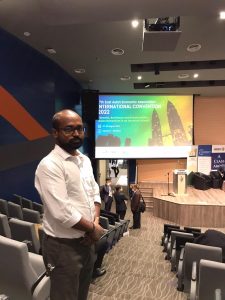
Dr J Vineesh Prakash, Assistant Professor, Department of Economics, presented a paper at the 17th East Asian Economic Association (EAEA) convention that was held on August 27-28, 2022 at Sunway University, Kuala Lumpur, Malaysia.The theme of the convention was “Growth, Resilience and Sustainability: Asian Dynamism in an Uncertain World”.
The East Asian Economic Association (EAEA) was founded in 1987 as the first international academic organisation devoted to East Asian economics. The international convention is its annual conference where papers for publication in the Asian Economic Journal are discussed.
Dr Vineesh presented the paper titled Does Business Group Affiliation Enhance Firm-Level Profitability? Evidence from Indian Automotive Component Industry, that addresses the growing competitive and volatile nature of economic sphere by testing the persistence of profit in a highly evolving emerging country environment such as India.
Emerging economies, such as India, confront different challenges than developed economies. The country has witnessed diverse regulatory environments, varying from highly regulated to more liberal ones. The more liberal environment coupled with the entry of overseas players into this realm has a definite impact on the existing industrial structure, thereby creating a volatile, ever evolving competitive environment.
The paper aims to address this issue and seeks to validate the part played by RBV in generating inimitable capabilities in a context-specific setting of a particular industry, i.e., the Indian automotive component industry. It also analyses the part played by business group affiliation in the post-reform era and its influence on profitability.
The paper found that profitability has moderate-to-high persistence and the variables, such as business group firms with overseas investments, export intensity, firm size, labour productivity growth, and past R&D intensity, have a contributory role in enhancing a firm’s profitability. Other variables such as business group affiliation, firm’s age, firm’s leverage, capital intensity, and A&M intensity have found to exercise a detrimental impact on the firm’s profitability.
Social implications of the research
The results, as reported in this paper, have some important implications for different stakeholders like managers, regulators, policymakers, etc. The finding that past R&D intensity has a positive influence on current profitability is significant to managers so they can allocate appropriate resources to fund such projects without many apprehensions.
The proof that labour productivity growth and profitability are positively related implies that managers could further focus on various in-house skill development programs to enhance labour productivity.
The finding of a positive influence of exports on profitability indicates that managers could further explore the external markets to boost up profitability as export markets are reportedly far more rewarding.
The discovery of moderate to high profit persistence has an important implication for regulators in order to facilitate healthier competition among firms. The moderate to high profitability persistence implies that the regulators have not managed to instill a reasonable level of competition in the industry through carefully crafted interventions, thereby facilitating its growth.
Dr Anil K Suresh’s path-breaking invention helps SRM University-AP “scale” new heights in scientific research!
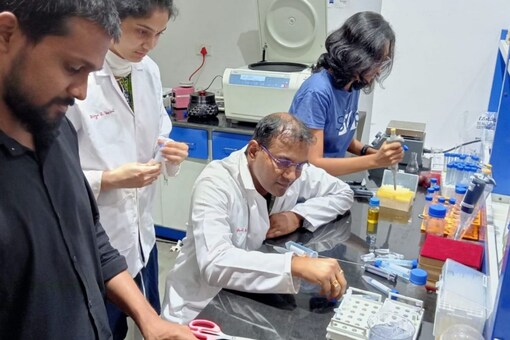
Dr Anil K Suresh, Associate Professor, Department of Biological Sciences with his team at SRM University-AP has developed a see-through transparent bio-template made from fish scale wastes. The sustainable transparent (over 85% transmittance) bio-template can substitute the use of eco-unfriendly disposal plastic cuvettes for UV-Visible Spectroscopy measurements in the spectrum of 350-900 nm. The path-breaking work to be published in the prestigious Journal of “Green Chemistry” by the Royal Society of Chemistry, is another in the line of extensive, socially, and scientifically relevant research studies that have taken form at SRM University-AP.
The multidisciplinary, research-intensive university since its inception, has emphasized research that has an impact on society. Through projects, collaborations and offering solid support to scholars, it has lived up to its mission of redefining the boundaries of advanced research. The new research by Dr. Suresh and his team comprising Ms Divya Parimi, Mr Chandra Bhatt, Mr Tharun Bollu, Ms Madhura, and collaborators Dr Malli and Mr Jacob is another noteworthy effort in the same vein. Besides minimizing the use of non-biodegradable plastic cuvettes for routine analytics, their bio-template offers many significant benefits.
UV-Vis spectroscopy is a versatile analytical tool used to examine the nature of various synthetic, biological and clinical molecules for pharmaceutical and environmental applications. The analysis is typically performed in a “cuvette or microplate” that is made of expensive quartz or eco-unfriendly plastic materials. The bio-template made from fish scale wastes can not only be an eco-friendly substitute but an effective one too. The team members have clearly demonstrated the practical on-bio template analysis of diverse analytes such as DNA, proteins, nanoparticles, organic dyes, bacteria, BSA assay, and dye-degradations.
Interestingly, the research team also demonstrated the ease in large-scale production of these bio-templates by generating 3000 of them at an affordable price. Dr Suresh, who owns the copyright for the invention after being granted an Indian patent says, “Large-scale development of the bio template can resolve several issues in performing sustainable research.” For starters, it will generate a demand for fish scales, which are usually discarded and can be a cause for foul smell and disease propagation. The use of these bio-templates will also minimize the need for non-biodegradable plastic cuvettes in routine analytics.
Dr Suresh highlights another benefit of the team’s path-breaking research when he says, “Unlike plastic cuvettes that demand a 500-fold analyte, our bio template allows the analysis at shallow 10 microlitre volumes, making it feasible to analyze expensive, rare, and high-risk analytes.” After use, the transparent bio template can be discarded back into the environment without any hesitation, as it is entirely biodegradable. The research that stemmed from the belief that food waste as a bio-resource stratagem has tremendous potential in routine scientific and pharma UV-Vis analytics is living up to that goal.
Dr Suresh is now set to bring the transparent bio-template made from fish scale wastes to the scientific community as a sustainable solution. He is grateful to his team’s efforts and the support he has received from the management at SRM University-AP throughout the research project. “I would like to thank Dr P Sathyanarayanan, President; Prof D Narayana Rao, Pro-Vice-Chancellor, Prof V S Rao, Former Vice-Chancellor and the entire management team for their untiring encouragement, motivation, and support in all my endeavours,” he says as the university “scales” new heights in the world of research, one significant invention at a time.
- Published in Biological Sciences Faculty, Blog, Faculty Achievements, Research

